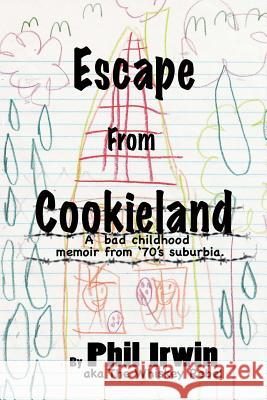Escape from Cookieland: A bad childhood memoir from 70's suburbia » książka
Escape from Cookieland: A bad childhood memoir from 70's suburbia
ISBN-13: 9781479183951 / Angielski / Miękka / 2012 / 208 str.
Sometimes a person emerges from American suburbia wild and a bit crazed and ready to do great and interesting things. Phil Irwin- iconoclastic musician, writer, and competitive chess player-is one of these people. He's written a "bad childhood" memoir that is sardonic, funny, sad, and unique. It is a coming-of-age story that paints a unique and compelling picture of post-hippie suburban America. The book is told in two parts. The first half is about Phil's life growing up as a brilliant but alienated youth trying to find his place in society; the second details his triumphant transformation into misanthropic rebel and affirmed alcoholic. In the first chapters Phil details his childhood as a self-described "egghead" and describes the various indignities he suffers in school and at the hands of his well-meaning but heavy-handed parents, religious fanatics for whom "Spare the Rod, Spoil the Child" is a favorite motto. In his early years Phil is a chess prodigy, and he describes that world-the various characters, the chess player's culture, his own arrogance as he begins to win, his idolization of Bobby Fischer, and his eventual triumph in adult tournaments. Being brilliant is more a curse than a blessing, however. He's so alienated at school that by the seventh grade he's already considering suicide. Discussing modern tragedies such as the Columbine shooting, Phil says: "If I had access to a gun, some kids would have possibly died...including me." When Phil's parents send him to Christian Camp in an attempt to bring him around to their way of thinking, he decides he's had enough. Contrary to their wishes, he returns home an avowed atheist. The second part of the book begins with a school-sponsored trip to Europe, one which solidifies Phil's antisocial leanings. He is immersed in a world completely alien to his experience, a world where one can drink every day and where intellectual prowess is not considered a shortcoming. When he returns home he has decided to live life on his own terms, parents and society be damned. The final chapters detail Phil's humorous adventures in petty crime, wanton vandalism, cruel pranks, and massive imbibing in parks and graveyards with a number of fellow malcontents. The book ends with Phil about to graduate high school. He has mixed feelings: coming of age has left a bitter taste, but at least he's escaped the clutches of a wasted youth spent in COOKIELAND. It's an ending that is wistful, bittersweet, and optimistic.
Zawartość książki może nie spełniać oczekiwań – reklamacje nie obejmują treści, która mogła nie być redakcyjnie ani merytorycznie opracowana.











